2017 MOMRI Annual Report Conference “Transforming Behavior Through Musicking”
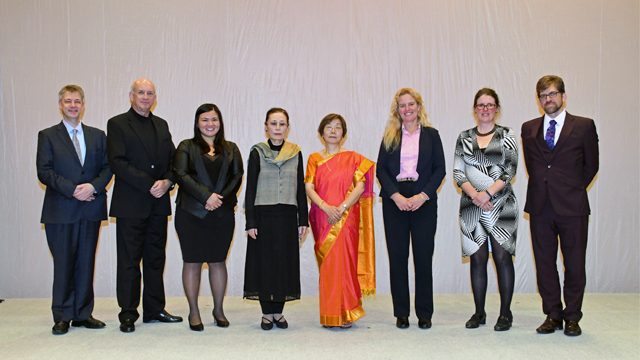 Our Annual Report Conference took place from Oct. 19 to 22, 2017, with a public symposium on Oct. 21 and strategic and thematic brainstorming sessions including MOMRI researchers and two special guests the other three days.
Our Annual Report Conference took place from Oct. 19 to 22, 2017, with a public symposium on Oct. 21 and strategic and thematic brainstorming sessions including MOMRI researchers and two special guests the other three days.
This year we enjoyed the participation of Prof. Fiona Magowan and of Dr. Muriel Swijghuisen Reigersberg, who contributed the opening and closing speeches.
Oct. 21 Public Event
Introduction:
The overall theme, “Transforming Behavior Through Musicking,” was introduced as follows:
Observing the behavior of some world leaders today, we can feel surprised, worried and disappointed. With climate change, nuclear disaster and global chaos threatening our very existence, what can we do? This is precisely the time when we, the people, can bring out the best in ourselves, our wisdom, resilience, creativity, compassion and solidarity. Musicking (taking action through music) offers us many ways to transform our behavior for the better, and to encourage others to do so. Our conference brought together scholars, activists and musicians from around the world to explore these issues.
 Keynote speech:
Keynote speech:
Shaping Peace through Sound Practices
By Fiona Magowan, Professor of Anthropology & Fellow of the Senator George J. Mitchell Institute for Global Peace, Security and Justice, Queen’s University, Belfast.
Sound is integral in shaping action and making lifeworlds. In today’s global context of escalating conflicts and violence that have led to mass displacements, loss and suffering, sound has the power to intertwine and cross-cut layers of sociality, influencing bodily interactions and reactions. Everyday sounds draw attention to complex layers of place-memories, dislocations of identity and disrupted emotions, creating opportunities for rethinking the role of music in peacebuilding. This presentation asks in what ways and to what extent can forms of sounding, active listening and immersive musical imaginaries influence peace? For those escaping from conflict, how does participation in and across disparate auditory and musical fields facilitate new sound (inter)connections and what challenges arise in understanding diverse emotional and behavioral responses? The argument explores these issues comparatively, from Northern Ireland to Australia, revealing the complexities of generating “sound practices” in the pursuit of peace.
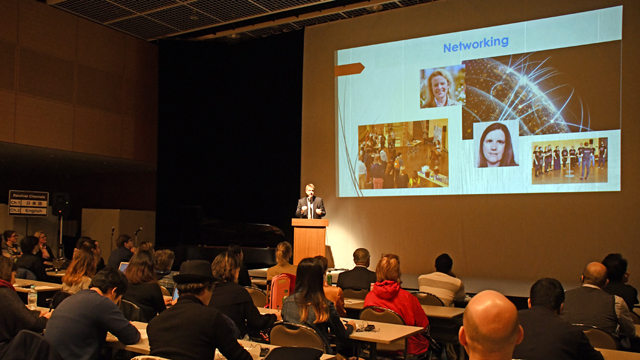 Report on MOMRI Activities 2016-2017
Report on MOMRI Activities 2016-2017
By Olivier Urbain, director of MOMRI
Today we celebrated the third year of MOMRI and I would like to share some of our achievements in 2016 and 2017. We edited a special issue of the Journal of Peace Education; we presented at conferences in Colombia & Venezuela, Canada & the US, Finland & the UK, Malaysia & Japan; through our networking, we met the two outstanding scholars who came from far away to join us today; through our “News & Topics” website, we share our most interesting activities (please join our mailing list!); since April this year, MOMRI is housed in the three-floor building next to the Min-On Culture Center, and our heartfelt gratitude goes to the entire administrators and staff members of Min-On for their support. We also would like to thank the scholars and artists contributing a unique performance of music from South India at the end of today’s event.
Music Education in Challenging Times: the Alma Llanera Program in Venezuela.
By Elaine Sandoval, MOMRI Associate Research Fellow and PhD candidate, CUNY.
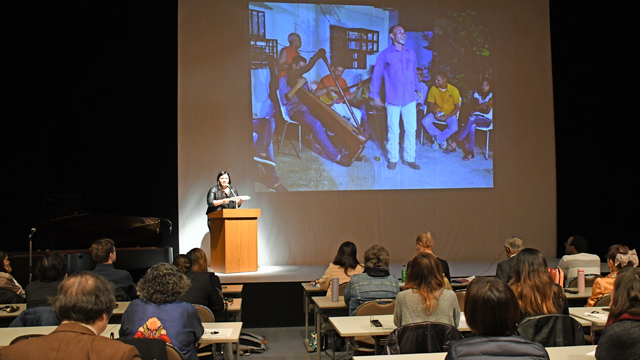 I presented my fieldwork with Alma Llanera, a new program within Venezuela’s world-famous music education system that includes local traditional music. I conducted research between September 2016-May 2017, concurrent with intensifying national food and medicine shortages, inflation, crime, and violent protests. Contrary to the sometimes overly romanticized narratives on “music in times of crisis,” I didn’t observe musicians using music performance as a way to express their struggles, nor as an escape from challenging realities. However, in pedagogical interactions, I observed important negotiations of identity and placement in relation to the national situation. I argue that in maintaining traditional forms of teaching and learning music, musicians demonstrate the importance of rooting themselves and participating locally as techniques to confront the challenges presented by the situation.
I presented my fieldwork with Alma Llanera, a new program within Venezuela’s world-famous music education system that includes local traditional music. I conducted research between September 2016-May 2017, concurrent with intensifying national food and medicine shortages, inflation, crime, and violent protests. Contrary to the sometimes overly romanticized narratives on “music in times of crisis,” I didn’t observe musicians using music performance as a way to express their struggles, nor as an escape from challenging realities. However, in pedagogical interactions, I observed important negotiations of identity and placement in relation to the national situation. I argue that in maintaining traditional forms of teaching and learning music, musicians demonstrate the importance of rooting themselves and participating locally as techniques to confront the challenges presented by the situation.
 Music and Wellbeing: A Socio-Critical Perspective.
Music and Wellbeing: A Socio-Critical Perspective.
By Craig Robertson, MOMRI Research Fellow.
Music and peacebuilding initiatives and research has thus far usually focused on reactive responses to a crisis or need. Recent scholarship in the UK is focusing on the wellbeing of the population in an effort to proactively change social behavior to increase wellbeing and thereby reduce the reliance on reactive medicalized interventions. The theoretical underpinning for this is that an aging, disconnected, lonely and depressed population is more of a strain on healthcare systems than a happy, healthy and connected one. Increasingly, music and the arts are being examined as a means to encourage this increase in wellbeing. I propose that this increase in wellbeing should be part of any preventive peacebuilding strategy and that music can play a crucial role at that level. This ties in with my previous theory about how music and lasting social change needs to occur first at the grassroots community level.
 Musicking as Ecological Behavior
Musicking as Ecological Behavior
By Michael Golden, MOMRI Research Fellow; Prof. of Music at Soka University of America
The slogan of Musicians Without Borders is, “War Divides, Music Connects.” Many people sense that music connects us in some way, but we don’t really understand how or why. Furthermore, we know that music can be used to connect one group of people against another, promoting violence. Aiming to more deeply understand the connective function of music, I’m exploring it from an ecological perspective, as something we do in relation to our environments. I will share one learning experience involving a student who connected with people of a culture very different from her own, and look at the music that inspired this change. I will conclude with a short piece of my own for piano which I hope might do likewise.
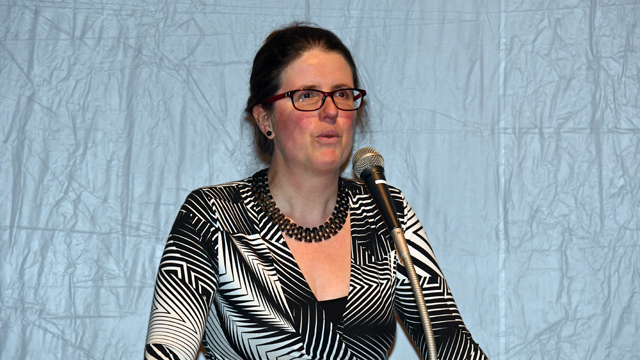 Final presentation:
Final presentation:
Research Excellence in Music and Peacebuilding: what is it and does it matter?
By Muriel Swijghuisen Reigersberg, University of Sydney.
Music and peacebuilding research includes music educationalists, music psychologists, music practitioners, (ethno)musicologists, scholars with a theological background and music therapists, to name but a few. This being the case, how might we reconcile our various world-views, methods and epistemologies and how will this “reconciliation” affect the “measuring” of research excellence in an age where Big Data is King and the world of research a global market? Whilst many research-oriented organizations use the term “research excellence” in their strategic documents, very few define what it is and to whom. Research excellence may mean many things to different disciplines. Can or should smaller research institutes define what research excellence is and why? This presentation will provide some possible answers to these questions.
Performance and Lecture on Southern Indian Musicking
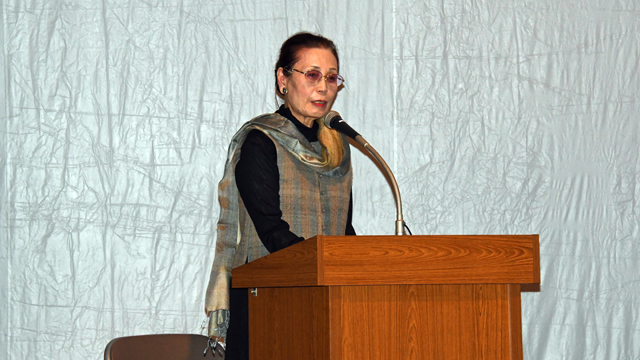
Prof. Harumi Koshima, a disciple of Dr. Fumio Koizumi, introduced the cultural uniqueness of the veena as a typically South Indian instrument, and Ms. Yuko Matoba performed several pieces that included amazing improvisations.
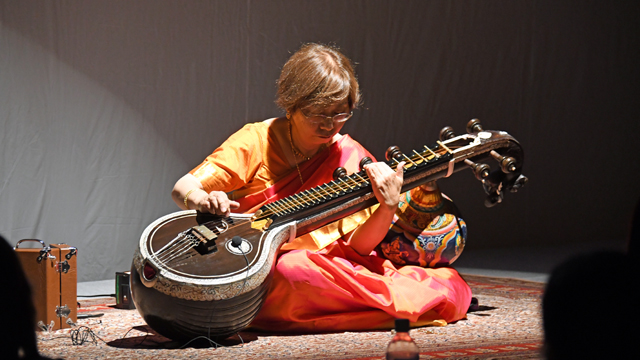
The Research Fellows and Staff of MOMRI are grateful for this opportunity to share our report through this website, and we will look forward to receiving your comments and questions.




